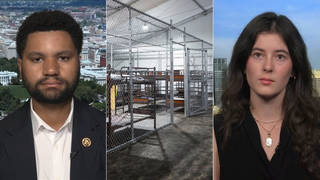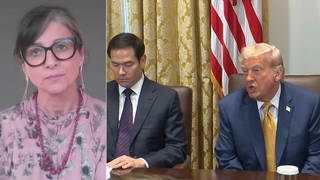
An official with UNITE, the Union of Needletrades, Industrial and Textile Employees, who was dressed as Santa was arrested this past week outside the Lord & Taylor’s in New York City for leading a protest against the department store for selling clothes made by child labor in New York, Indonesia and Honduras.
Yesterday in Washington, Senator Tom Harkin, Democrat from Iowa; consumer advocate, former presidential candidate Ralph Nader; and Ferris Harvey, head of the International Labor Rights Fund, held a press conference to urge holiday shoppers to be on the lookout for products made using child labor on the shelves of toy stores this holiday season.
Tom Harkin talks about the lack of consumer knowledge about who has made the products we buy. Ralph Nader is pushing for passage of tough legislation to ban child labor imports. Ferris Harvey, who is one of the leading voices against child labor around the world, criticized the Clinton administration for putting the interest of free trade ahead of children’s rights.
Transcript
AMY GOODMAN: Santa Claus was arrested this past week outside Lord & Taylor’s in New York City. An official with UNITE, the Union of Needletrades, Industrial and Textile Employees, dressed as Santa, led a protest against the department store for selling clothes made with sweatshop and child labor in New York, Indonesia and Honduras. UNITE released a report naming the stores which are naughty and nice. The union is planning similar protests in other major U.S. cities to pressure retailers to do something about sweatshops, which undercut union wages and capture union jobs.
In Washington, Senator Tom Harkin, Ralph Nader, and Ferris Harvey of the International Labor Rights Fund held a press conference to urge holiday shoppers to be on the lookout for products made with child labor on the shelves of toy stores this holiday season. Here’s Senator Tom Harkin, Democrat from Iowa.
SEN. TOM HARKIN: The holidays are indeed a season of hope, and it’s a season for our kids — and not just for our kids, but kids all around the world. And that’s why we’re here today. The clock is ticking: only 14 more shopping days to go ’til Christmas. Around the country, parents are entering the malls and the stores with long shopping lists for their kids.
Today we have a few products here that are probably on the Christmas lists of a lot of kids, all except one, of course, and you could probably guess which one that is. But this can of tuna is out of place for more than just that reason, because around the world products like this soccer ball right here, these tennis shoes and this dress right here, these are all being made for kids by kids.
But most consumers are entirely unaware of this. You see these products in the store. They’ll have a label on it. It will tell you where it’s made, but it doesn’t tell you who made it. The price tag will tell you how much we have to pay to buy it, but the price tag will not tell you how much someone had to pay to make it. For example, the price tag on this soccer ball will tell you how much it costs, but it does not tell you that a young child in South Asia, perhaps no older than 5 years of age, paid to make this soccer ball by working in cramped, slave-like conditions, stitching this ball together for hours on end for about a dollar a day. The price tag won’t tell you that. Instead of a label on these products, there’s just a question mark about who made them, under what conditions.
Now, take this can of tuna, for example. When you go in to buy this can of tuna, there’s a label on it. And you’ll see there’s a little mark there, and it says “dolphin-free.” So you know when you buy this can of tuna, that this tuna was caught with procedures that do not ensnare dolphins. So we have laws that protect dolphins.
Our laws prohibit the importation of ivory. Our laws prohibit the importation of endangered species like the spotted turtle. Our laws prohibit the importation of products made by prison labor. So we protect animals, we protect prisoners, but our laws are silent when it comes to children. We cannot, somehow, find it within ourselves to protect children. We can protect the turtles, and we can protect the dolphins, we can even protect prisoners, but we can’t protect kids.
Well, that’s got to change. It’s outrageous that when a consumer buys a can of tuna, they know they’re protecting dolphins, but when they buy the soccer ball, they don’t know how it’s being made by kids in South Asia. And that’s why Congressman George Miller and I will reintroduce legislation as soon as the Congress reconvenes that would place a voluntary label on garments and sporting goods to empower consumers to let them know whether the product they see in the store shelves were made without child labor.
It’s like this Rugmark. You’re all familiar with the Rugmark. It’s being used right now so that if you go in to buy a hand-made rug made in Asia, South Asia, if this has the Rugmark on it, you know that it’s certified that it was not made with child labor, just like this label on a tuna. You know that it’s dolphin-free, protects dolphins. Well, we need the kind of label on all of our goods that come into this country, like on tennis shoes, a label that makes sure that when you go in as a consumer, that you know it was not made with child labor.
AMY GOODMAN: That was Iowa Democratic Senator Tom Harkin. Consumer advocate and former presidential candidate Ralph Nader is pushing for the passage of tough legislation to ban child labor imports, even though the administration says such a law could violate the General Agreement on Tariffs and Trade, known as GATT.
RALPH NADER: According to the International Labour Organization, 120 million children, mostly in the Third World, are working full-time, many of them in brutalized dungeons and other unsafe working areas, instead of going to school and living in more healthy conditions. Another 130 million children are working part-time in such conditions. And so we have something on the order of 250 million children, a quarter of a billion children, between the ages of 5 and 14, working under brutalized conditions to produce products, many of which are imported into the United States and sold in very fancy department stores and other retail outlets throughout the country, without any indication of how they were produced.
In this country, child labor is illegal. It has been illegal for decades. You cannot produce a product with child labor in this country and sell it in this country. But under the new GATT trade agreement, child labor abroad in brutalized conditions can produce products like carpets and sell them legally in the United States. And while I think this legislation, sponsored by Senator Harkin and Congressman Miller, is a good first start to make consumers aware and give them a role to reject products made by brutalized child labor abroad, I also favor a bill that Senator Harkin introduced in 1994, which was called the Child Labor Deterrence Act. That would have outlawed the importation of products into this country made by brutalized child labor abroad.
The problem is that when Senator Harkin introduced it and he had hearings on it in the latter part of 1994, he was informed by the Congressional Research Service and by Mickey Kantor, then the U.S. trade representative, that his bill, the Child Labor Deterrence Act, that would ban the importation of products in this country made by brutalized child labor abroad, was GATT illegal. That is, it would be challenged by another country before a secret tribunal in Geneva under the World Trade Organization, and it would be considered illegal under the terms of the agreement that Congress and President Clinton approved in 1994.
That indicates that although child labor is illegal in this country, this country cannot protect children abroad by engaging in a trade sanction such as a ban on imports. And it illustrates the infringement of our sovereignty on such a critical issue by the world’s largest economy, because of the provision in the GATT trade agreement that says that similar products cannot be distinguished in terms of trade restrictions based on how they’re produced — except for prison labor — based on how they are produced. And how they are produced by brutalized child labor is not a illegal procedure under GATT.
I would add one more suggestion for consumers to this list. In addition for consumers looking for the “made in U.S.A.” label, making their voice heard in the retail store, contacting manufacturers directly who they think are importing products made by brutalized child labor abroad, spreading the word and writing their members of Congress, they should also ask the manufacturers for the actual codes of conduct that these manufacturers are adhering to and are allegedly imposing on their subcontractors in places in Asia, Africa, South America. Ask for the actual text of the codes of conduct from such major retailers and manufacturers that are pretty much trade names known throughout the United States.
AMY GOODMAN: That, the familiar voice of Ralph Nader. Ferris Harvey was also at the news conference, one of the leading voices against child labor around the world. He heads up the International Labor Rights Fund. Yesterday, he criticized the Clinton administration for putting the interests of free trade ahead of children’s rights.
FERRIS HARVEY: It is often said, I think, by people who recognize that in many countries children do have to work, that if we were to try to ban products made by child labor, we would be taking food out of the mouths of children. Banning child labor will have a different effect. If there are 250 million children at work in the world today, according to the ILO, there are also, according to the ILO, 1 billion adults who are unable to find enough work to support their families. Now, the basic problem we face in this globe is that because adults can’t get jobs and employers want to hire small children who are docile, who will not organize trade unions, who will not demand a minimum wage and who can be worked unmercifully for unmerciful, long hours, we have a situation in which there are too many children working and too few adults.
The steps that you have proposed, both the bill to ban the import of products made by child labor and the bill which you will reintroduce to label products that are not made by child labor, are very important first steps, as Ralph has said, first steps toward bringing the attention of the consumer and the attention of governments in countries that are inclined to ignore these problems, that commerce in the products made by child labor will no longer be tolerated.
I get calls virtually every day from consumers, who want to say, “Tell me what I can buy that is not made by a child laborer. I’m going to buy something for my children for Christmas. I do not want it to be made at the expense of some other child.” The list you’ve made is a very good list. I would add also one more thing, and that is, look for a union label. We’ve stopped looking for union labels in this country because the union movement has been so pushed down over the last 50 years that we don’t think of it as an automatic recognition that products are made under good quality. But I can tell you, on the basis of travel in most of the countries where child labor is a serious problem, where unions exist, child labor doesn’t. So look for a union label, as well.
Child labor is worsening. The global economy is pushing countries to compete on the basis of driving standards down instead of improving conditions for workers. And the bills you have proposed are an important break against that downward slide.
You mentioned the Rugmark program. Rugmark has been very successful in Europe. More than 300,000 carpets in the last year and a half have been imported into Europe from India and now, in the last few months, from Nepal, that are certified to be made without child labor. But we have run into difficulty in this country from rug merchants in the U.S. who want to soak up the market being deserted by the European importers, and are resisting the notion of trying to buy and sell carpets made without child labor with the Rugmark label. We need to get the word out to the department stores, to the retailers, to the wholesalers, that we are ready and no longer willing — we are ready to make a change and no longer willing to tolerate the stocking of carpets that cannot be certified to be made without child labor.
There’s also a really important campaign going on relating to Hong Kong, Thailand and China, where about 80 to 90% of the toys that will be under the Christmas trees in this country are being made. As many of you are aware, toys are an industry that has some of the most abusive conditions, the most unsafe conditions of any industry in the world. We need to lend support to those campaigns to clean up the toy industry, so that kids can not only have safe toys, they can know they’ve been made under safe conditions.
The president took a very important initiative earlier this last year by sort of bullying a number of carpet and footwear industries into establishing an apparel and footwear industry initiative. That initiative is in full motion right now. I participate in those discussions We are developing an industry code of conduct. We are developing a monitoring system that will bring the industry together with independent monitors, with nongovernmental organizations, human rights organizations, all around the world, to certify that products are not made by child labor. That will be moved remarkably forward by the introduction and the passage of the bill that you have proposed. There is much that is happening. We can end the scourge of global child labor, if all of these initiatives are given our full efforts.
AMY GOODMAN: Ferris Harvey of the International Labor Rights Fund. He, Ralph Nader and Senator Tom Harkin were speaking at a news conference yesterday about the use of child labor around the world. Tomorrow, Democracy Now! will take on Disney. You’re listening to Democracy Now! If you’d like to get a copy of today’s show, you can call 1-800-735-0230. That’s 1-800-735-0230. Up next, the Charline Brundidge story, after this break.













Media Options